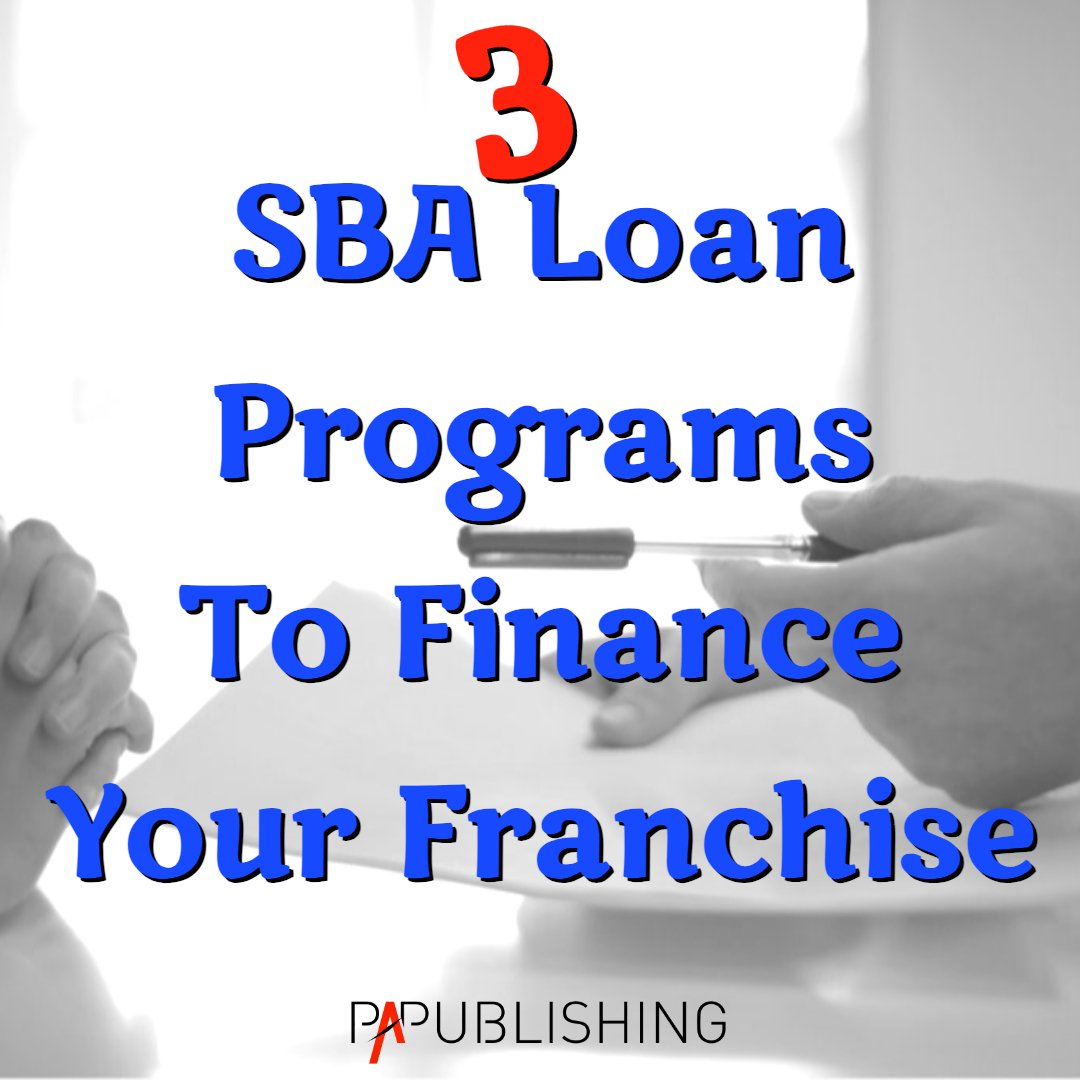Franchises are a simple and effortless way to jump right into the business world – to finally be your own boss.

Plus, franchises are probably the easiest businesses to get financed because they usually do not come with a lot of the start-up risk (unknown risk) that banks and other business lenders tend to shy away from. Since most franchises come with strong brand names, proven profitability and cash flow track records and tend to perform well in nearly any location (globally), these business models have the propensity to fly through the loan underwriting process and go from application to funding in no time flat.
In fact, the Small Business Administration (SBA), in hopes of speeding up their funding process and funding more franchise loans, have created a “SBA-approve franchise” list – a list of franchises that the SBA has already vetted through their underwriting process.
SBA Loan Programs For Franchises
According to Jim D, a former moderator for the SBA.gov website;
“SBA-approved franchises are select business opportunities whose agreements have been accepted by the SBA. When it comes to securing an SBA-backed loan, those applying for an approved-franchise have it easier and quicker. Applicants for SBA-approved franchises benefit from a streamlined review process that expedites their loan application. Because the particular franchise is pre-approved, the loan review is less complex and focuses on specific aspects of that brand’s business plan.”
So, if the SBA likes franchises so much, what loan programs do they offer?
3 SBA Loan Programs For Franchises
First things first. The SBA does not directly provide loans to business or franchise owners. Thus, you will still have to take your loan request to a SBA lending bank or financial institution. However, these originations also know that the SBA likes proven franchise businesses and are more than willing to review and process your application.
When seeking a SBA loan for your franchise you should focus your specific financing needs and match them to the SBA’s loan program as follows:
SBA 7(a) Loan Program: This is the SBA’s flagship program designed to fund almost all aspects of a business.
According to the SBA, the 7(a) loan program can be used:
- To provide long-term working capital to use to pay operational expenses, accounts payable and/or to purchase inventory
- Short-term working capital needs, including seasonal financing, contract performance, construction financing and exporting
- Revolving funds based on the value of existing inventory and receivables, under special conditions
- To purchase equipment, machinery, furniture, fixtures, supplies or materials
- To purchase real estate, including land and buildings
- To construct a new building or renovate an existing building
- To establish a new business or assist in the acquisition, operation or expansion of an existing business
- To refinance existing business debt, under certain conditions
This program has a maximum loan amount of $5 million with the average, in 2012 – the last published figure, being around $337,730.
As most SBA loans come with longer loan terms making monthly payments even more affordable, loan maturities for real estate can go out to 25 years, up to ten years for equipment and up to seven years for working capital.
Now, all SBA loans are assumed to be fully collateralized by either business or personal assets. However, while the SBA expects this, they will not decline a loan based solely on the lack of adequate collateral.
Lastly, know that these loans do require that the borrower provide 20% or more as a down payment or their own equity in the deal. Thus, the SBA will only guarantee 80% of the needed amount.
As you should be able to see, this SBA program can cover almost all franchise financing needs from real estate purchase and development to business equipment to working capital needs. Thus, if that is what you need to buy or grow your franchise, start here.
CDC/504 Loan Program: The 504 loan program, like the 7(a) program, is great for franchises. However, this program is limited to real estate and equipment purchases only.
According to the SBA, the 504 loan program can be used for;
- The purchase of land, including existing buildings
- The purchase of improvements, including grading, street improvements, utilities, parking lots and landscaping
- The construction of new facilities or modernizing, renovating or converting existing facilities
But, the real benefit with this loan program is that the equity portion or down payment required from the borrower is lower – usually around 10% – thus, requiring less out of pocket expense.
How this program works. This program was designed to help facilitate additional business growth and development within community areas. Thus, when a 504 loan is requested and approved, a local Community Development Corporation (CDC) – the community part of the loan – will fund and guarantee up to 40% of the loan request, a local SBA approved bank will fund 50% of the loan request leaving the remaining 10% from the borrower. Three partners all working for the same goal – the long-term success of your franchise.
This program can provide up to $5 million for businesses that can and will create jobs in the community, up to $5 million for businesses that provide stated public benefit such as energy reduction or alternative fuels as well as rural development businesses, minority, women or veteran businesses, export companies – just to name a few – these are stated goals that are known to have public benefit and as such the SBA wants to fund these companies. And, up to $4 million for small, job creating manufacturing firms.
Lastly, to make these loans and their resulting payments more affordable – ensuing the long-term success of the borrower – the SBA will allow loan terms of 10 and 20 years.
SBA Express Program: The SBA Express program is like the little brother of the SBA’s 7(a) loan program with several benefits and restrictions.
First, this program offers a hastened review process. In fact, the SBA guarantees that your express loan application will receive a response in less than 36 hours. But, while you might receive a response, this does not mean you will receive an approval. It just means that you will know that the SBA has receive your application and they will usually ask for additional information from you at that time – but, at least you know it is being worked.
Second, the maximum loan amount under this program is only $350,000. Which is not a huge amount these days but might be enough to get you into the franchise of your dreams – especially when compared to the average loan amount of the full 7(a) program of around $337,730.
Third, the SBA will only guarantee up to 50% of the loan amount – meaning that more of the risk of the loan will fall back onto the bank or lender. Yet, if your deal is strong enough, this 50% guarantee might just be the difference between approval and denial.
Lastly, these loans offers loan terms up to 7 years only and can be used for nearly any business capital need.
What Is A Small Business?
Now, to qualify for a SBA loan, your franchise has to meet the SBA’s small business definition of:
- Be for-profit.
- Have up to 500 employees – up to 1,500 for manufacturing.
- Have under $21 million in annual receipts – less for certain businesses or industries.
Which nearly all individual franchise businesses fit.
Conclusion
Franchising is a great way to jump into the business world with a proven, well known business model. Yet, like almost all businesses on the planet, financing that franchise either to get it started or to grow it is still a hard hurdle to overcome.
Yet, as stated and hopefully shown, franchises do tend to get more favorable approval rates when using government guaranteed funding programs like these SBA loans. And, it is not just that the SBA views these types of businesses in an encouraging light but so do banks and other business lenders – those other partners needed to get your SBA loan approved and funded.
However, just because your chosen franchise is or is not on a SBA-approved list and that your loan request and use of funds meets these criteria, does not mean that you will be automatically approved. The only way to know for sure if you and your franchise will be approved is to apply. And, since you have to apply no matter what option you chose, you might as well apply with a financial organization or business funder that already works with the SBA – it can only double your chances of getting the capital you need to fully realize your franchise dreams.
Source by Joseph H. Lizio


